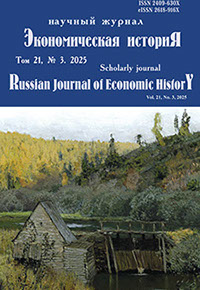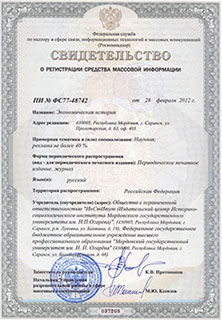Экономическая историЯ
Russian Journal of Economic History
ISSN 2409-630X (Print)
ISSN 2618-916X (Online)
Expert board:
- Scientific Council of RAS on economic history;
- Research and Educational Center «The economic history of Central Russia and the Middle Volga region» of Ogarev Mordovia State University;
- Center of Economic History of Lomonosov Moscow State University
Navigation
ISSN 2409-630X (Print), ISSN 2618-916X (Online)
DOI: 10.24412/2409-630X.070.021.202503.271-282
Elena Z. Gracheva1, Alexander V. Martynenko2
1, 2 Mordovian State Pedagogical University (Saransk, Russia)
1 e-mail: p629@yandex.ru
2 e-mail: arkanaddin@mail.ru
Entrepreneurial initiative and state interest: interaction between the authorities and Russian merchants in the implementation of trade in Iran in the 1840s – 1850s (based on the example of the activities of the “Moscow House for Trade with Asia”)
Abstract
Introduction. The Russian Federation and the Islamic Republic of Iran are currently building a mutually beneficial partnership that is strategic in nature and particularly important given the external challenges and threats both countries face. This underscores the relevance of studying the history of all aspects of Russian-Iranian relations, including trade between our countries. The purpose of this article is to provide a structural, comprehensive analysis of the activities of one of the important actors in the trade between the Russian Empire and Qajar Persia in the 19th century – the Moscow House for Trade with Asia.
Materials and Methods. The study is based on a body of work by domestic and foreign experts on Russian-Iranian trade. Methodologically, the article relies on a civilizational approach, which allows it to highlight the sociocultural characteristics of the subject matter. The authors also employed a hermeneutic analysis of documentary sources on 19th-century Russian-Iranian trade.
Results. The 19th century holds a special place in the history of relations between Russia and Iran. Both states entered the century as geopolitical rivals, a fact confirmed by a series of wars. But even then, the Russian Empire’s ruling circles were beginning to understand that sustainable dominance in the Middle East was ensured not so much by constant political pressure but by mutual economic interest. The rivalry between Great Britain and Russia in the region as part of the Great Game also played a role in this process. The threat of Russian goods being displaced from the northern Iranian provinces, where they had previously predominated, necessitated the search for effective countermeasures. One such measure was the activities of the Moscow House for Trade with Asia, which are analyzed in this article.
Discussion and Conclusion. The authors of the article conclude that, despite serious organizational and material preparation, as well as significant support from Russian diplomats, the initial results of the Moscow House in Iran did not meet the expectations of its founders and government curators. At the same time, amidst intensifying Anglo-Russian trade and economic rivalry, entrepreneurs were forced to develop new regions to market domestic goods, cooperating within trading companies and joining forces with government agencies. This tactic became a prelude to the eventual division of Iran into spheres of economic influence between the Russian Empire and Great Britain.
Keywords: Russian Empire, Qajar Persia, Russian-Iranian trade, Moscow House for Trade with Asia.
For citation: Gracheva E. Z., Martynenko A. V. Entrepreneurial initiative and state interest: interaction between the authorities and Russian merchants in the implementation of trade in Iran in the 1840s – 1850s (based on the example of the activities of the “Moscow House for Trade with Asia”). Ekonomicheskaya istoriya = Russian Journal of Economic History. 2025; 21(3): 271–282. (In Russ.). DOI: 10.24412/2409-630X.070.021.202503.271-282.
Acknowledgements: The study was carried out within the framework of a grant for conducting research work in priority areas of scientific activity of partner universities in network interaction (Chuvash State Pedagogical University named after I. Ya. Yakovlev and Mordovian State Pedagogical University named after M. E. Evseviev) on the topic “Russia and Qajar Iran: interaction of empires in the trade, economic and religious spheres”.
© Ogarev Mordovia State University. History and Sociology Institute, 2017
68, Of. 411, Bolshevistskaya St., 430005, The editorial office of the scholarly journal «Russian Journal of Economic History»
Tel.: (8342) 24-25-90; 27-07-11, Fax: (8342) 24-25-90, E-mail: jurnal-econom-hist@isi.mrsu.ru
Designed by A. Napalkov, Email: napalkov@isi.mrsu.ru


